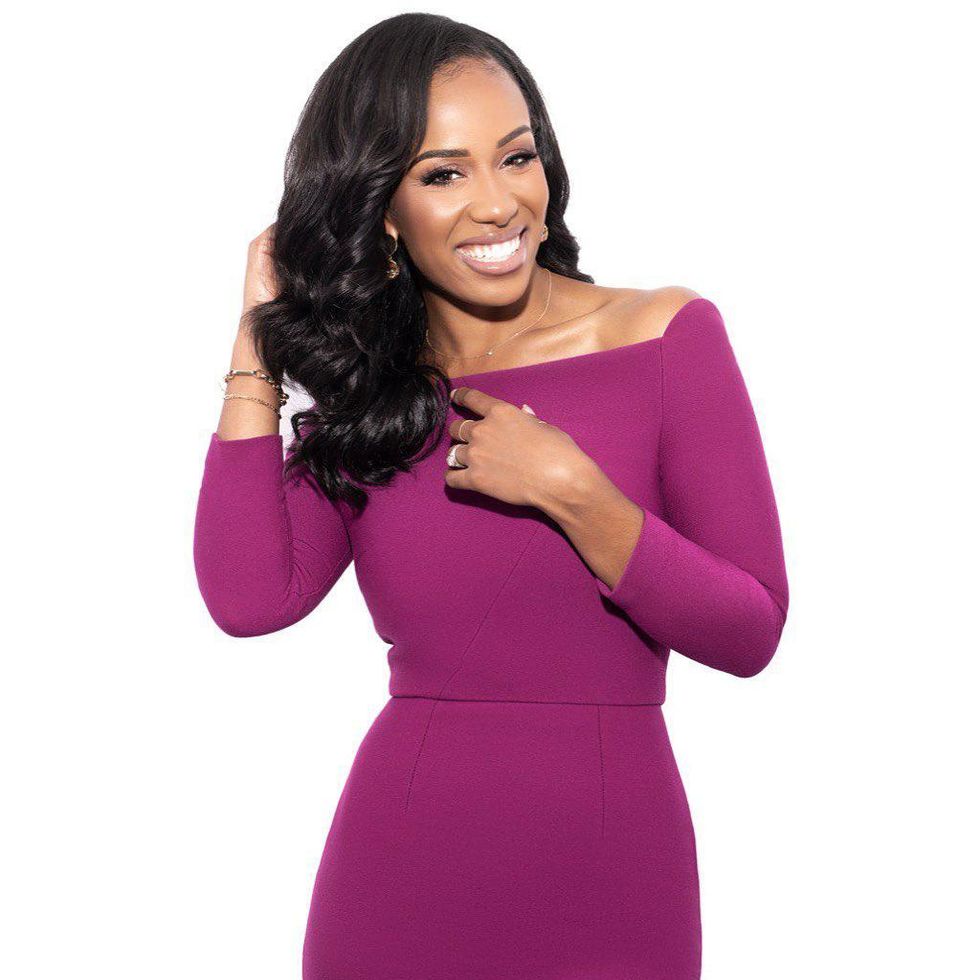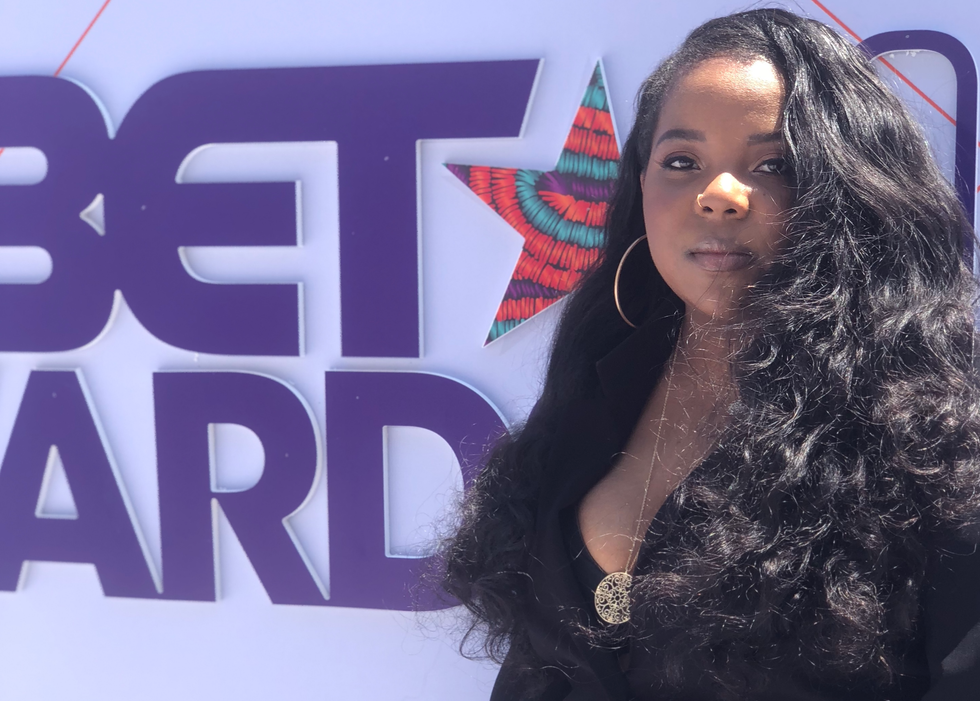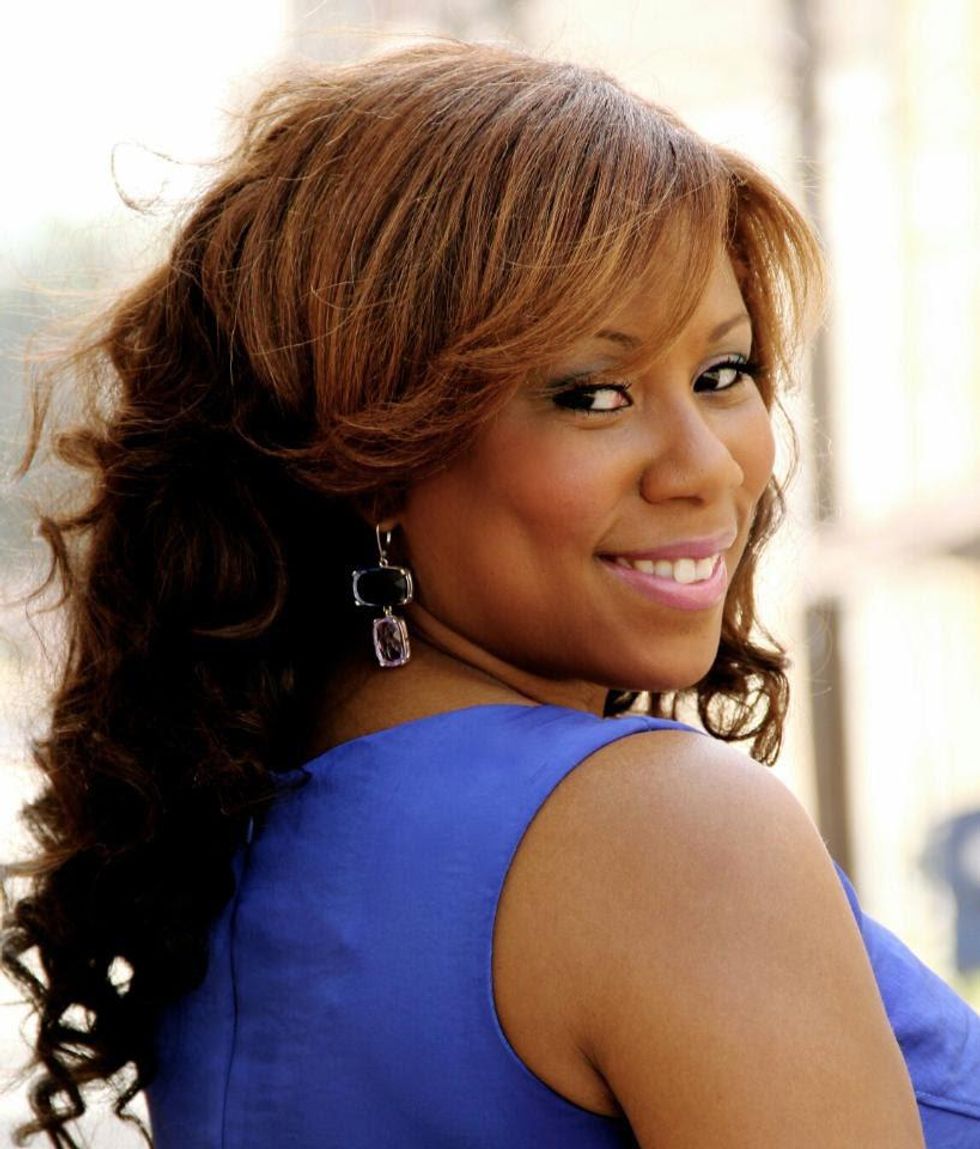
Don't you think it's funny that as human beings born imperfect, we despise making mistakes so much? Making mistakes is something that we've been doing since we were given the chance to breathe and which we'll pretty much continue to do for the rest of our lives. It's a character trait that we all share. Yet, it's also something that, oftentimes, we strive to avoid and struggle to forgive ourselves or fail to brag about when we allow it to happen. (Yes, I said, "brag about." You read that right.)
Despite the uncomfortable feeling that it can provide us with, I believe that making a mistake is a beautiful thing to do. Although I agree that they can be tougher to learn from, mistakes are impactful life teachers and the fundamental lessons that they carry with them deserve to be put under the spotlight and passed along rather than being considered shameful secrets.
If anything, I'm sincerely grateful to have crossed paths with women of color who share this point of view throughout my life. I'm even more grateful to those that recently granted me some of their time to tell xoNecole about their biggest career mistakes, the things they would've done differently, the lessons that they learned, and more.
Jeannette Reyes, 31

Courtesy of Jeannette Reyes
News Anchor for FOX5 DC
Her biggest career mistake and the things she would've done differently:
"I had just turned down a job offer in my dream city because I didn't feel I was good enough for it. For much of my career, I didn't bet on myself because I felt like a fraud and felt like I didn't deserve the position I was in. The handful of times when I did take a leap of faith, it was largely motivated by fear.
"The news director who'd offered me the job was the first to tell me that I was probably experiencing Imposter Syndrome. It was the first time that I'd heard of it. I didn't realize until years into my career that I'd been suffering from it. When it comes to the things that I would've done differently, I believe I would've been intentional about correcting my self-talk earlier in my career.
"Our minds have a way of emphasizing mistakes to fit a certain narrative and minimizing our successes as just luck. I was often my worst enemy in that respect. It took the joy out of a lot of things when it came to any accolades or promotions I got."
What the journey to access resilience looked like:
"My rock bottom wasn't so much physical as it was spiritual and emotional. I had spent so much of my life being motivated by fear and the desire to prove to myself that I was worthy of my accomplishments, I found myself chasing after the wrong things. Although I'd achieved everything I set out to do, I still wasn't satisfied.
"I put in some serious work to address my negative mindset, my source of motivation, what my fears were, whether they were legitimate or not, and what I found to be fulfilling. It was a tough few months for me during which I had to get reacquainted with myself all over again and that has shown me that you can have everything you've dreamed of and still be unhappy. Happiness and fulfillment should be found within."
The lessons that she learned from making this mistake and her advice:
"When you suffer from Imposter Syndrome, you're less likely to advocate for yourself, go after a certain higher salary, negotiate a higher salary, etc. because you're convinced that you're lucky to even be there. Not to mention that you experience a constant fear of being 'exposed', so it feels best to lay low.
"However, I've learned that we shouldn't be ashamed to be our biggest fans. Self-talk is powerful. We often wouldn't speak to a friend—even a stranger—the way we speak to ourselves. So, my advice is mainly to give yourself some grace and know that you've earned whatever successes come your way."
"What helped me was having a mentor who is just as much a spiritual mentor to me as a professional one. During my most insecure moments, she would figuratively hold a mirror up to me to show me who I really was and remind me of the things I had accomplished despite what I'd been through. Our self-image can be so distorted, sometimes it takes someone else to remind us of who we really are."
Follow Jeannette on Instagram @msnewslady.
Alisha Robertson, 32

Courtesy of Alisha Robertson
Business Coach
Her biggest career mistake and the things she would've done differently:
"One of the biggest mistakes that I've made was chasing someone else's idea of success versus focusing on what I felt I was called to do [and] listening to all of the marketing gurus and making products that I wasn't excited about because that's what I thought would make me successful. Because of that mistake, I suffered from severe burnout which, in return, pushed me into starting over in my business so that I could do it the right way.
"If I could go back, I would've spent more time figuring out what I wanted and developing actionable steps that would get me closer to that dream. I would've set boundaries around my work and my clients, and would have leaned more on the marketing strategies that were working for me versus attempting to do all the things."
What the journey to access resilience looked like:
"I truly believe that just because you hit rock bottom, it doesn't mean that you're supposed to stay there. I figured that, even if I needed to shift and start over, I could easily build another successful business again. So I took the time that I needed to rest and get back to myself mentally. Only then did I get back to work. I spent about a year just getting clear on what I wanted as well as the impact that I wanted to make. I also spent that time working through and trying out different business models.
"That's what entrepreneurship is about—taking the time to experiment and see what works and then building on whatever results you receive. Eventually, I figured out something that stuck. I felt some guilt at first and was down on myself for a while but I always kept going back to my 'why'."
"That bigger reason for doing what I do is what got me up every day even when I wanted to throw in the towel. But I also knew that one day, that experience would be a huge part of the story that I tell today."
The lessons that she learned from making this mistake and her advice:
"There are three major lessons that making this mistake taught me:
- To get clear on what my desire and the way I want to impact the world and those around me;
- To not be afraid to shift and pivot if it'll help me get closer to my ultimate goal;
- To trust my gut and stay consistent with putting that mission out there. That's what will help separate me from the others.
"If I had a piece of advice, it'd be to keep your eyes on your own path. And as you go through your journey, always take time to reconnect with your 'why' and your ultimate goal to ensure that you're on the right track of building your business your way. There isn't anything wrong with pivoting but make sure that those changes are what you want and not what everyone else wants for you."
Follow Alisha on Instagram @thealishanicole.
Keyera Williams, 27

Courtesy of Keyera Williams
Producer at Westbrook Inc.
Her biggest career mistake:
"My biggest mistake so far was probably not understanding what my actual value is and not advocating for more. I've had a few jobs in the past where I knew what I was bringing to the table but was afraid to ask for a bigger salary thinking that, in return, I'd get reprimanded or have that opportunity taken from me.
"I've said 'yes' to a lot of opportunities below my pay grade because I felt like I should simply be grateful for the opportunity. I remember working 50+ hours a week and barely being able to pay my rent."
"As a Black woman, you're constantly being force-fed just enough and told that you raise trouble if you complain or advocate for more. I'm all about good trouble, and it's taught me how to advocate for myself or either to go somewhere else where I'm valued."
What the journey to access resilience looked like:
"That journey is still ongoing, to be honest. There are days where I still feel like I'm not good enough or I don't believe that my voice matters because I've spent time in places where I was constantly treated as such. It's a journey that includes a lot of therapy, self-evaluation, and just learning how to move forward.
"Moreover, I believe that there's no such thing as a last opportunity. What's for you is for you, and when you walk in your purpose, opportunities will keep presenting themselves to you."
The lessons that she learned from making this mistake and her advice:
"I've learned that if I don't know what I'm worth, no one else will remind me. It's important to know your worth not just in regard to the dollar amount, but also when it comes to your mental health and quality of life. I've also learned to not be afraid to reach out to mentors or ask questions to find out if something is normal within the industry I work in [and] moreover, to recognize when a person, place, or opportunity is no longer serving me or pushing me toward the person and the creative I want to become.
"As for my advice, unfortunately, there will be jobs that you have to take to get your foot in the door. The money won't always be great, but take advantage of these opportunities to prove your value and your capabilities so that when you move on, you have work to show and can also negotiate what you're worth."
"Lastly, check the market. See what people occupying the same position as you in your field are making and advocate for the same—if not more based on your education and experience."
Follow Keyera on Instagram @keywilliamss.
Chi Ilochi, 21

Courtesy of Chi Ilochi
Founder of StylingByChi | Fashion Stylist & Image Consultant
Her biggest career mistake and the things she would've done differently:
"One of the biggest mistakes I've made in my career is not understanding the power of 'no'. I would oftentimes stretch myself thin because I thought my value came from being able to deliver when people needed me. This mistake resulted in stress and exhaustion because I had so much on my plate. I couldn't even hang with my girls or have a brunch date.
"Of course, not knowing how to say 'no' resulted in more opportunities career-wise, but it also resulted in an unhealthy amount of stress that wouldn't allow me to capitalize on those opportunities. Knowing what I know now, I would've said 'no' more often, and taken more time to understand the saying, 'What's for me is meant for me.'"
What the journey to access resilience looked like:
"My journey to access resilience was one of the loneliest periods of my life. I had to take the time out to sit with myself and my mistakes so I could learn the right way to show myself grace.
"I knew that little progress would be made if I spent my reflection period beating myself up about my mistakes. Instead, I forgave myself for what I did wrong while reaffirming myself for the things I did right."
"It took me about two years to navigate this hard process but once I completed it, I realized that I am far more capable than I thought I was. I am not my mistakes and I don't have to identify with them."
The lessons that she learned from making that mistake and her advice:
"I've learned that your value isn't found in how much work you can fit on your plate, it's in who you are as an individual and the quality of your work. Therefore, work at the pace that works for you and remind yourself that success isn't found in your ability to overextend yourself. These two lessons shifted my mindset from scarcity to abundance."
"It's hard to do better and be better when you've conditioned yourself to operate out of scarcity. Abundance requires vulnerability, and my lessons have taught me that it's OK to be vulnerable. It's OK to say, 'Hey I've got too much on my plate right now.' One thing that I know for sure is that when you allow yourself to be vulnerable, the opportunities flow abundantly and stress becomes a thing of the past."
Follow Chi on Instagram @Igbohippie_.
Ponchitta Lanoue, 46

Courtesy of Ponchitta Lanoue
Beauty Entrepreneur
Her biggest career mistake and the things she would've done differently:
"I decided to start a business to offset some of the unhappiness I felt in my personal life and career. But while building the latter, I made some of the worst decisions which only made my life harder.
"I would say that the most detrimental mistake was taking all the money that I had to put it into my business and not knowing where to put it or where to invest."
"I started my business with my savings of $20,000 and then my brother invested $5,000. I blew through the money in less than eight months. For five years, I was flat broke because of that [and] a bitter divorce that left me empty-handed. My business was surviving on a wing and a prayer.
"If I could do it all over again, instead of buying too many product categories and not being able to sell them, I would have launched with four lip colors and sold the hell out of them until my lipstick line paid for the next category. I would have bought $100 Facebook and Google ads each month to promote the brand and sell the products. I would have focused less on investors or trying to get capital and would've been more worried about figuring out what exactly it was that my customers wanted from me. However, as difficult as it got at times, I honestly don't think I would've wanted to do anything differently. I needed to grow through those growing pains."
What the journey to access resilience looked like:
"So many times we don't want to grow because we fear change and failure. Change is the catalyst that pushes us into action. Failure is the impetus that propels us into destiny if we are wise enough to keep going."
"I had to move in with my mother to bounce back. It has taken me six years to recover from those two major life-changing events. I thought I would never recover from the financial losses that I experienced as a result. For the longest time, I was hard on myself because I could not believe that I allowed myself to be in this situation. It seemed like I was always starting over. It caused me to go into a deep depression. I was even angry at times. A conversation that I had with my grandmother years ago helped me pick myself up and dust myself off. After that, I was able to forgive myself and give myself more grace."
The lessons that she learned from making that mistake and her advice:
"Those experiences made me stronger and wiser. Eventually, I came to understand that money isn't the answer to all problems. You can have a lot of money, but if you don't know what to do with it, then all that you have is a lot of money—no direction. The major lesson, however, was learning the power that I possess. I don't need 1 million followers to define my success. A solid group of 100 to 300 customers can easily keep the lights on and sustain a business.
"My advice is to start small and then promote your products all day every day. Define your target audience and sell to them specifically. Don't worry about being popular, but find influencers that can be brand ambassadors for your products or services. Be frugal and watch every single dime. Do not focus on money or a man; instead, make sure that you're never in a position to depend on a man for happiness or finances."
Follow Ponchitta on Instagram @ponchcosmetics.
Featured image courtesy of Alisha Robertson
- The Mistakes Of My 20s Equipped Me For My 30s - xoNecole ... ›
- 5 Amateur Mistakes You're Making In The Workplace & Don't Even ... ›
- 7 Boss Women Reflect On Their Biggest Career Lessons Of 2019 ... ›
- 5 Amateur Mistakes You're Making In The Workplace & Don't Even ... ›
- How To Change Your Career - xoNecole: Women's Interest, Love, Wellness, Beauty ›
Your December 2025 Monthly Horoscopes Are All About Surrender & Alignment
December is about letting go. We end the year with the need for more peace, reflection, and rejuvenation, and that is exactly what December is providing for us. The Sun is in Sagittarius, and anything is possible. This is the month to believe in that and to know that the universe is supporting you. With a Supermoon in Gemini as we begin the month as well, we have an opportunity to gain the closure we have been looking for this year and to wrap up old projects, ideas, and communication breakthroughs.
This is the month to make your peace the priority and let go of trying to control the way the tides are turning. Trust in your new beginning, and give yourself time to prepare for it this month.
A big part of the clarity that is coming through this month is due to Neptune going direct in Pisces on December 10, after being retrograde here since July. With Neptune now direct, we are able to see our inspiration and creativity a little more clearly, providing the perfect energy for dreams and manifestation to be built upon. The smoke is clearing, and it’s up to you to decide what you want to do with this newfound clarity that this transit is bringing. Mercury also moves back into Sagittarius on December 11, which is great for communication and clarity, and the adventures you were trying to see through at the beginning of November come around for you again with greater purpose and support.
On December 15, Mars enters Capricorn until the end of January 2026, and this is the extra push we need to make important changes and to be on the path towards greater abundance, stability, and prosperity. Mars in Capricorn takes care of business, and we have extra energy at our disposal during this time to do so. This transit is an ideal time to focus on your career or financial goals for next year and to start putting some of these plans into motion now. A few days later, we have the New Moon of the month, which will be in Sagittarius on December 19, and this is the perfect New Moon to manifest.
The energy is high, magic is in the air, and it’s all about moving forward with the new beginnings that are inspiring you and bringing you joy to think about right now.
Capricorn Season officially begins on December 21, and this earth sign energy is how we heal, gain closure, and build new foundations in our world. With Venus also moving into a Capricorn a few days later, there is something about peace, prosperity, and security that we are gaining in life and in love as we close out the year, and this is what we need right now. This month is about reflecting on what was, letting go of old hurt, and renewing. December is an ending and a new beginning in one, and there is magic in this space to be created.
Read for your sun and rising sign below to see what December 2025 has in store for you.
 AriesKyra Jay for xoNecole
AriesKyra Jay for xoNecoleARIES
December is a full-circle moment for you, Aries. You are seeing the gifts in your world and have a lot of gratitude for the way things have come about for you as of late. There are culminations in your world that are providing you with more abundance, stability, and community, and you are exactly where you are meant to be this month. With the Sun in a fellow fire sign and in your 9th house of travel for most of the month, December is a good time to get out of your comfort zone, explore the world around you, and get your body moving.
Mars, your ruling planet, also makes a change and moves into Capricorn on December 15, which will fuel your inspiration and power in your career space. You are making a lot of professional progress as we close out the year; however, make sure to be more mindful of your competitive drive right now. The New Moon on December 19 is the perfect opportunity for you to create some new plans and goals when it comes to traveling, education, and where you want to gain some new inspiration in your world. Overall, this is a month of things coming together for you serendipitously.
 TaurusKyra Jay for xoNecole
TaurusKyra Jay for xoNecoleTAURUS
December is about trusting your intuition, Taurus. You have a lot on your mind this month, and it’s best to delegate, communicate, and allow yourself some relief by opening up to someone and not feeling like you have to hold everything in. As we begin the month, we have a Supermoon in Gemini happening in your house of income, and the plans and projects you have been building here come to fruition for you now. This is the time to gain clarity on your financial world and to take a look at what spending habits you want to let go of here as well.
With Venus in your 8th house of shared resources for most of the month, you are doing a cleanse on your commitments, partnerships, and business ventures. You are taking a look at what you want to dedicate yourself to in the future, and what commitments you may need to let go of now in order to be in the space you truly want to be, both financially and within some of your relationship dynamics. Before we end the month, we have a New Moon in this same area of your chart, and it’s time to look at the opportunities that are presenting themselves and to trust your internal guidance system to lead you forward.
 GeminiKyra Jay for xoNecole
GeminiKyra Jay for xoNecoleGEMINI
You are moving forward fearlessly this month, Gemini. December is your month of love, passion, and dignity, and you are owning the light that you shine. We begin the month with the last Supermoon of the year, happening in your sign, and you are stepping up to the plate. You are showing up, owning how much you have grown this year, and allowing yourself to heal while also acknowledging that you have done your best and you deserve to have fun in the midst of the changes you are creating.
Mercury, your ruling planet, is officially out of retrograde, and you can use this energy to the fullest potential now. With Mercury in your 7th house of love, it’s time to speak from the heart and to talk about the things that matter and that are inspiring you right now to your loved ones. You never know what kind of epiphanies you may have when you open up the conversation to others. Before the month ends, you have a New Moon in this same love area of your chart, and this New Moon is all about manifesting romance, commitment, and abundance in your world.
 CancerKyra Jay for xoNecole
CancerKyra Jay for xoNecoleCANCER
December is an opening for more love, more joy, and more freedom in your life, Cancer. You have come to a place where you hold so much gratitude in your heart for where you are today and where your heart is shining, and things come together for you with more ease right now. With the Sun in your 6th house of health, work, and daily routines for most of the month, you are getting your ducks in a row while also putting more energy and effort into taking care of yourself, your priorities, and your well-being. This month surprises you in many ways, and it’s because you are showing up.
Mars and Venus both move into your house of love, relationships, marriage, and abundance this month, and you are making strides in your love life. You have both of these opposing forces on your side and are being recognized for the love you are while also receiving the love you want. This month, overall, is about focusing more on the positives in your world and letting your heart have its joy. Before December comes to an end, there is a New Moon in Sagittarius, and this is the perfect opportunity to create the plans you want to see through next year, especially when it comes to your work life, colleagues, business ventures, and health.
 LeoKyra Jay for xoNecole
LeoKyra Jay for xoNecoleLEO
The scales of karma are balancing, and they are balancing in your favor this month, Leo. December is your month of truth, and of seeing it clearly in your world. The Sun is in your house of romance, pleasure, and happiness for most of the month, and it’s time to relax, be in the present moment, and allow what is meant to be, to be. With a Supermoon in your 11th house of manifestation as December begins, this is a powerful month for seeing your dreams come to fruition, and for feeling like the intentions you have set this year are finally here for you now.
Mars also moves into your 6th house mid-month, and this is the perfect energy to have to move into the new year. You have extra energy at your disposal right now and are feeling fearless with what is possible for you and your daily routine. Before the month ends, we also have a New Moon in a fellow fire sign, Sagittarius, and this is a breakthrough moment for you and your heart. December, overall, wants to show you how loved and supported you are and will be doing so in magical, unexpected, and concrete ways.
 VirgoKyra Jay for xoNecole
VirgoKyra Jay for xoNecoleVIRGO
December is a month of victory, Virgo. You are showing up and experiencing some new successes in your world that move you forward on your path in life. With a Supermoon in your 10th house of career as we begin the month, the effort and intentions you have made this year come into full bloom, and you are being recognized for who you are and the good work you have done. This month is all about showing up and allowing yourself to be seen and loved, knowing that you deserve the support and opportunities you are receiving.
Mars moves into Capricorn on December 15, which brings the passion and excitement into your love life, hobbies, and little pleasures in life that light you up. You want to have fun this month and are going to be walking into the new year with this fearless, happy, and spontaneous energy within you. Before the month ends, Venus also enters Capricorn, and in this same area of your chart, you have a lot to look forward to and believe in right now. Overall, December wants you to be happy and will be doing everything possible to make that happen for you. This is your month to shine, Virgo.
 LibraKyra Jay for xoNecole
LibraKyra Jay for xoNecoleLIBRA
December is a month of opportunity for you, Libra. New doors open, and you are financially making breakthroughs this month because of it. December begins with a Supermoon in your 9th house, and you are getting a clearer view of where you have been making strides in your life and how it has all brought you here to this present moment of freedom. This month is showing you what happens when you are fearless with your purpose and when you believe in yourself and what you are worthy of.
Moving further into December, Mars moves into your 4th house of home and family mid-month, and you are closing out the year in your safe spaces. You are spending more time with your loved ones and taking the time to quiet your mind and listen to what your heart has been telling you. Before the month ends, we have a New Moon in Sagittarius, happening in an area of your life that deals with communication. This is a great time for getting the answers you have been looking for and for feeling more clear-headed and confident about the decisions you are making as you move into the new year.
 ScorpioKyra Jay for xoNecole
ScorpioKyra Jay for xoNecoleSCORPIO
Patience is a virtue this month, Scorpio. December is all about remaining patient and vigilant with what you are creating in your world, and knowing that the universe has your back. It’s time to be reminded of the power of hope, and this month is an opening to greater clarity in your life. There is a lot of energy in your financial zones right now, and this is providing you with new opportunities and new insight; however, the speed at which things come about for you may feel daunting. Keep your head up and eyes focused on what you want and know that you are more than worthy of receiving it.
With Mercury in your 2nd house of income this month, December is a good time to plant new seeds and to think about where you want to be financially a month from now or even a year. This month is asking you to think bigger and to think more long-term so that you can set the appropriate plans into motion now. We also have a New Moon in your house of income before the month ends, and this is when you will see more of your dreams come to fruition in this area of your life, and have more opportunities to build. Overall, December will be teaching you a lot, Scorpio.
 SagittariusKyra Jay for xoNecole
SagittariusKyra Jay for xoNecoleSAGITTARIUS
Sagittarius Season is here, and there is a lot in store for you this month, Sag. December is all about what you are dedicating yourself to. It’s about setting your intentions and putting the work in to back up your dreams, and about getting things in order so that when the new beginnings come, you are ready for them. The Sun and Venus are in your sign for most of this month, and there are a lot of eyes on you right now. You have the potential to create a new beginning for yourself, and it’s time to invest in yourself, your love life, and your dreams.
Mercury moves into Sagittarius on December 11, and this is giving you another opportunity to see through some of the plans that you had initiated in November. Mercury was retrograde in your sign last month, and there may have been some disruptions to your vision and plans for the future, and now this energy is turning around for you. Before the month ends, we also have a New Moon in Sagittarius, and you are walking through new doors fearlessly. You are catching others by surprise by your growth this month, and you are thinking a lot about your purpose, future, and plans for the new year.
 CapricornKyra Jay for xoNecole
CapricornKyra Jay for xoNecoleCAPRICORN
December is all about the vision, Capricorn. You are moving through a lot of changes and transformations this month, yet they are giving you a chance at a new beginning in the process. You are focused more on the future and what goals you want to manifest for yourself right now, and are ready to let go of what hasn’t been working for you. With the Sun in your 12th house of closure for most of December, this is your time for healing, but remember, healing doesn’t have to be isolating or boring; you can thrive while you renew, and you are this month.
Mid-month, the excitement picks up for you, and you are feeling more energized than you have in a while. Mars moves into Capricorn until the end of January 2026, and you are being proactive with your goals, intentions, and passions. You are a force to be reckoned with this month, and you are making things happen for yourself with confidence. Capricorn Season officially begins on December 21 this year, and this is definitely speeding up your healing process. You are breaking free from what was, and with Venus also moving into Capricorn before the month ends, you are leaving this year in high spirits and with love opening a new door for you.
 AquariusKyra Jay for xoNecole
AquariusKyra Jay for xoNecoleAQUARIUS
December is all about community, creativity, and manifestation, Aquarius. This is the month to work together with others to help bring your dreams to life. You are in a space of inspiration, empowerment, and beauty, and are creating more of this energy around you and in your world. Look out for what support comes your way this month and know that you don’t have to do everything alone to succeed. With the Sun in your 11th house of manifestation and friendship, your intentions are coming to fruition, and it’s time to celebrate with the people you love and to own how far you have come this year.
On December 19, we have a New Moon in Sagittarius, lighting up your life in all of the best ways possible. This is your New Moon of freedom, victory, and magic, and you are seeing new beginnings appear that you were once just hoping for. Before the month comes to an end, Venus moves into your 12th house of closure, and after an active and successful month, you are ready to relax, heal, and give your heart some of the attention it has been asking for. You are moving into the new year with the need to release and renew what hasn’t been working in your relationships, and you are finally ready to.
 PiscesKyra Jay for xoNecole
PiscesKyra Jay for xoNecolePISCES
December is a big month for you, Pisces. You are making some huge accomplishments this month, and are feeling like everything you have been through this year has been worth it for these moments that are coming to fruition for you now. The Sun is in your 10th house of career and reputation for most of the month, and this is where a lot of your focus is right now. You are claiming your successes and putting yourself out there in ways that not only serve you, but that inspire others as well.
Neptune officially goes direct on December 10, after being retrograde in your sign since July, and you are finally seeing things a little more clearly. You are feeling renewed inspiration and passion in your life, and your intuition is your strongest asset right now. Before December comes to an end, we also have a New Moon in your 10th house of career, and what happens now not only changes things for you in the present, but it also opens new doors and what is possible for you in the new year as well. Overall, you are on top of your game this month and are owning the joy and empowerment you feel.
Featured image by Kyra Jay for xoNecole
Why The Cayman Islands Is The Ideal Soft-Life Island-Hopping Destination
It's always a pleasure to add a new stamp to the passport, especially when it's an opportunity to visit a country you've never been to. When invited to explore the Cayman Islands, I was very familiar with Grand Cayman—the largest among the three islands, known for its stunning clear-blue beaches, and modern city comforts—but I seriously slept on Cayman Brac.
On a six-day trip, I knew Grand Cayman would be that girl, but the smaller sister island Cayman Brac? She’s the captivating, low-key spot that is a whole soft-life fantasy.
This trip was my first time in the destination, via the Cayman Islands Department of Tourism (@visitcaymanislands) and it had all the luxe chill and exploration that makes for great memories that will prompt anybody to want to return again and again. Plus, it was the tail end of rainy season, which is basically my jam because off-peak travel makes me feel like a VIP. I get the beauty, the beaches, the food, the people—without the crowds and noise.
Let’s get into how you can pack your Cayman Islands itinerary with cultural exploration, elevated cuisine, deep restoration, and an island-hopping adventure along the way.
GRAND CAYMAN
Grand Cayman hits you with that effortless island confidence from the moment you land. It’s the largest of the Cayman Islands, known for crystal-clear Caribbean waters and a culture that blends British influence with laid-back island charm.
Visitors pull up for Seven Mile Beach, stingray encounters, fresh seafood, and those luxe resorts and villas that make unplugging way too easy.
Where To Stay

Courtesy/Grand Cayman Marriott Resort
Grand Cayman Marriott Resort: This property offers ocean views, polished comfort, with easy access to everything near Seven Mile Beach. (Marriott stays are often a go-to for me when I’m in the mood for a resort stay where the standards are consistent no matter the destination).
The spacious rooms, warm staff, and a pool area perfect for quick resets between adventures were a hit for me. Despite the patchy rain, lounging by the pool felt like a reset button.
I popped into the gift shop and found pieces from Isy B, the Cayman-based brand created by Isy Obi, a Black woman who pivoted from finance to fashion. The designs are bold, colorful, full of vibes I love to reference when returning home.
Botanica Luxury Cottages: The cluster boutique cottages blend island-chic décor with modern touches. My cabin had vaulted ceilings, washer and dryer, roomy showers, a cozy lounge area, and a private outdoor nook with stylish umbrellas and seating perfect for reading, sunbathing, or unwinding. A pool is just a short walk away on the property and Seven Mile Beach was just a quick drive. I took a two-mile stroll along the shoreline where families, chilled-out tourists, and sleek beach clubs lended to a balanced and laid-back but lively environment.

Courtesy/Botanica Luxury Cottages
Where To Eat
Pom Pom: This breezy rooftop lounge serving curated cocktails with a relaxed, stylish vibe and mellow music was the perfect evening welcome to the island. And the sunsets are divine.
Avecita Chef’s Table: It’s an amazing multi-course dining experience where chefs craft global flavor fusions right in front of you. Expect bubbles, bold tastes, and an ambiance that feels refined without being pretentious. This is one experience I definitely plan to fly back to Cayman for in the new year.
Pepper’s Bar & Grill: Conveniently located just across the street from the resort, it’s a local casual spot with live music and unique takes on Caribbean meal staples. The Cayman-style jerk pork was a favorite.
Ristorante Pappagallo: Set on a 14-acre bird sanctuary overlooking a saltwater lagoon, this brunch delivered everything from sushi to risotto to curry goat to barbacoa tacos. The white tablecloth elegance paired with homestyle warmth and peaceful water views made the whole experience feel elevated yet comforting.Bacaro
Bacaro: This is where we had our farewell dinner, enjoying their Venetian-inspired small plates and curated cocktails. If you want a final night with your partner or even your best girl group, this is the spot.
Things To Do:

Courtesy/Island Soul
Floating Sound Bath with Island Soul: The floating meditation was calming, grounding, and deeply restorative. We had the sky and breeze as a backdrop and listened to music, prompts and chimes that allowed us to simply float and be.
Anchor & Den Cocktail Class at the Grand Cayman Marriott Resort: I thoroughly enjoyed this lively, hands-on cocktail-making session which would be fun for couples, friends, or anyone wanting a playful evening activity without leaving the property.
The Grove: This is a foodie and art-lover's delight with its dining and culture scene that features spots like Island Naturals, a chill café with plant-forward dishes—where the mushroom tacos were everything, and the tuna poke nachos are a must—and upscale spots like Mykonos Steak Club. After eating, stop by Carlos Garcia’s gallery, a working studio and public exhibition space that supports a collective of local and international artists, and regularly hosts events, pop-ups, and live painting.
Pirates Week Festival: This was a welcome surprise addition to our itinerary, and it's an event held in November across the Cayman Islands, with the major events happening in the heart of Grand Cayman's George Town. During the finale, I was out there jumping and whining to Nessa Preppy and Faith Callender, rum in hand, surrounded by locals and pure island joy. As a woman who loves soca, that moment lit me up. It was the perfect last hurrah with a slice of home, culture, and celebration.
Bonny Moon Beach Club: It’s a Tik Tok-famous stylish beachfront lounge experience that, for me, actually matched the good reviews. The octopus ceviche and everything from the woodfired portion of the menu were a hit and the DJ added the right amount of energy. We ate just steps from the ocean. It's swanky, atmospheric, and ideal for date night, girls’ trips, or baecations.
CAYMAN BRAC
Known for dramatic limestone cliffs, caves, and some of the best diving in the Caribbean, the vibe in Cayman Brac is slower, more local, and perfect if you want nature, real island culture, and adventure without the crowds. I took a quick Cayman Airways flight from Grand Cayman and spent two days there.
The visit was honestly one of the most peaceful, soul-nourishing parts of my trip. The moment I landed, the island reeled me in—raw, mysterious, almost cinematic in its quiet beauty. There’s a softness that feels like an alluring secret.
Where to Stay

Courtesy/Le Soleil d'Or
Le Soleil d’Or: This is a farm-focused boutique haven with luxury villas, a restaurant, a pool, and its own beach club. Our villa was huge, complete with a kitchen, living room, laundry space, game room, and the modern luxury master suite of my dreams.
The bathroom had a soaking tub that fit my 5’7"-plus frame, a large shower, and his-and-her sinks. The bedroom had tons of storage, a large comfy bed, and a mini fridge, plus a TV lounge and veranda opening to the pool. Honestly, my suite could’ve been a full studio apartment back home—I was blown away.
The farm-to-table meals, which I could enjoy at the restaurant just steps away from my suite, were rich, fresh, and soulful. My morning walks on the property were serene, wrapped in nothing but nature and quiet.
If you want an escape from the tourist and business buzz of Grand Cayman, this is the perfect hideaway for a baecation, girls trip, or solo venture.

Courtesy/Le Soleil D'Or
Things To Do & Good Eats
Rock Iguana Yoga: This soothing yoga and therapeutic art experience was set in lush island terrain and was a grounding, earthy immersion that eased my back pain from stress, and was a great quiet time to reflect and release. The instructor was patient, graceful, and welcoming.
Le Soleil D’Or Beach Club: It's a chill open beachfront that offers a peaceful, quiet experience in the off season. Think serene solitude, gentle waves, and open space to unwind—far from the typical beach club scene with loud DJs, pumping music, and high-energy crowds.
Star Island Restaurant: This restaurant reminded me of my favorite local spots in Jamaica where you can get food with spices and tastes like your Caribbean grandma or auntie made the meals with love. The menu includes Caribbean dishes like jerk chicken and Cayman's national dish, stewed turtle.
I’ve been to several islands across the Caribbean—with my tried-and-true all-time favorite being Jamaica—and I must say, if you want that soft-life island-hopping luxury adventure paired with opportunities to connect with a rich arts, music, and culinary scene, a trip to the Cayman Islands is exactly that.
Featured image via Shutterstock









